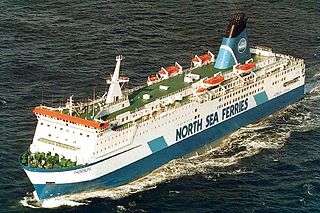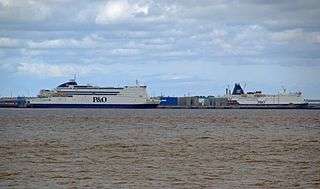MS Norwind
MS Norwind was a North Sea ferry that was later used in the Mediterranean Sea.
History
The Norwind was the first ferry to sail on the Hull-Rotterdam route for North Sea Ferries in 1965. In 1965, increasing car ownership made the government introduce the 70 miles per hour speed limit on motorways. Overseas travel and trade was growing too, and a new company was finishing its plans to create ferry links between the UK and Holland.
On 17 December 1965 North Sea ferries started their inaugural ferry service. The ferries Norwave and Norwind sailed on their inaugural sailings from Hull to Rotterdam’s Europoort. With Norwind a schedule was established that is continued to this day. P&O’s interest was through its subsidiary General Steam Navigation Company, which had a 35 per cent stake in North Sea Ferries. With ships of 4,306 tons and 360 feet long, it wasn't the space for 249 passengers that was unusual it was the ships’ capacity for trucks, trailers, coaches and cars.[1]
 Norsun was one of the two 3rd Generation ferries that replaced Norwind and her sister.
Norsun was one of the two 3rd Generation ferries that replaced Norwind and her sister. Norwind's legacy is continued with the Hull-Rotterdam and Hull-Zeebrugge routes flourishing.
Norwind's legacy is continued with the Hull-Rotterdam and Hull-Zeebrugge routes flourishing.
The service was reported by journalists as being too ambitious. Too small ships for such huge requirements and one even predicted that the route would not survive! Although, they were proved wrong. In 1965 alone 54,000 passengers were carried.
Nine years later, demand was growing for North Sea ferries and two new ships, more than twice as large as before, Norland and Norstar were introduced on the Hull- Rotterdam route, therefore replacing Norwind and Norwave. Before they were sold the decision was taken to transfer them to a new route, Hull-Zeebrugge. In 1974 they appeared on this route and therefore, again, starting another important service.[1]
In 1987 after 22 years of faithful service the new ferries Norsun and Norsea were introduced on the Hull-Rotterdam route. They replaced Norland and Norstar, moving them down to Hull-Zeebrugge. Norwind and Norwave left UK waters for the Mediterranean that year as they were just too small for the still growing car carrying community.
Heavily rebuilt, Norwind was sold to Ventouris and renamed Grecia Express. She was deemed to be a total loss following sinking in 1993.[2]
References
- "onboardpoferries.com | North Sea Ferries". www.onboardpoferries.com. Retrieved 2016-11-01.
- "North Sea Ferries - Ferry Photographs - Ferry Postcards". www.simplonpc.co.uk. Retrieved 2016-11-01.